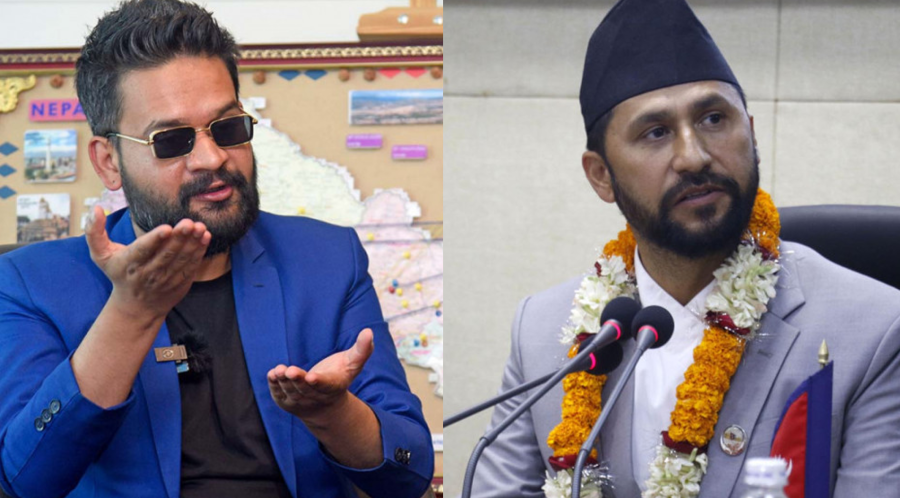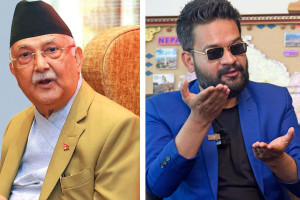Columns
Beyond Balen and Rabi
Can the political messiahs lead their disillusioned flock to the promised land?
Bishal Thapa
Balendra (Balen) Shah and Rabi Lamichhane burst into Nepal’s rugged political landscape like two messiahs in a hurry, offering a tantalising promise to lead disillusioned Nepalis to the promised land of good governance, zero corruption, development and progress. Nepalis are loving it all. So, we march on, behind our messiahs, towards the promised land.
Shah is the mayor of Kathmandu. In the last elections, he defeated the heavily favoured candidates of the Nepali Congress, Sirjana Singh, and the CPN-UML, Keshav Sthapit, who was also a former mayor of Kathmandu. Although an engineer by training, Shah gained prominence as a Nepali rap artist. Not just any rap, but battle-rap, where performers freestyle, relying on spontaneity and instantaneous rhythm to outdo other performers. He has carried his penchant for spontaneity into political office.
Lamichhane is a Member of Parliament from Chitwan-2, chairman of the Rastriya Swatantra Party, and former deputy prime minister and home minister. He established the party just six months before the 2022 general elections, and went on to lead it to become the fourth-largest party in Parliament. He won elections twice from the same constituency within just a few months of each other after the courts nullified his first election on the charge that he was not a Nepali citizen. He won with a large majority in both cases. By the time of his second, even larger resounding election victory, Nepalis weren’t asking whether he was a Nepali or not, but whether he was even human at all. Such was the embodiment of his overnight political success.
Like Shah, Lamichhane was a popular public figure prior to commencing his political journey. A journalist who combined tough questions with a focus on cases involving corruption and injustice. He packed in nationalism and editorial monologues into entertaining television shows. For seven years between 2013 and 2020, he held the world record for the longest marathon show on television, lasting over 62 hours in a single stretch.
Balen and Lamichhane bring all the prerequisite traits to succeed in Nepal’s political scene—smarts, ambition, ruthlessness, an ability to read the mood, enough new ideas, marketing capabilities, organisation skills, and the greatest of them all, the gift of the gab. They will no doubt go on to establish long successful political careers.
Nepal has gained two political messiahs who appear to be poised for greatness. But these gains must be equally tempered by what Nepal has lost.
With the transition from civilian to political life, we have lost a talented rap artist. Not just any rap artist but a battle-rap artist. Nepal’s rap cultural scene will never be the same again. We have lost an entertaining journalist. Nepal’s search for the truth, at least ones that unfold in entertaining ways, will never be the same again.
Civil society
The sensational successes of Shah and Lamichhane also exhibit a deeper failure within Nepal.
Shah and Lamichhane both promised significant political changes. Would they have had greater success in achieving those changes if they had worked on those goals as civil society members (a rap artist and a journalist), which they were before, instead of becoming politicians, which they are now? Could they have utilised their prominence and convening authority of civil society members without the need for the state’s political power to achieve those changes?
Yes, and they could possibly have achieved a whole lot more in terms of impact. If every doctor, engineer, artist, journalist, businessperson, mother, father and citizen wanting to bring positive change were to become a politician to achieve those goals, there would be no more citizens, only politicians.
Shah and Lamichhane may have had many motivations for wanting to join active politics. Their right to engage in the political process cannot be restricted or even questioned. Every citizen wishing to participate in the political process directly by contesting elections, or as a party functionary must have the right to do so. For many people with the right acumen, this is also the right profession for them.
But political power is not the only instrument for achieving change. Civil society seeking to deliver change must reject the lure of politics. Politicians run the country. But citizens make the country. We would be much more successful in building a stable political system with a prosperous economy if civil society were able to keep political leadership on track, influence better policymaking, and secure proper implementation. For the country, the political system must work. Civilians, not politicians, are the ones that can get it to work.
Such civil activism requires more than just showing up to vote. It requires active convening, organising and mobilising. Which is why the defection of Shah and Lamichhane to the political establishment is a great loss. Nepal’s civil society is poorly organised and even more poorly resourced. Its organisations lack leadership depth. Those that have the capability to address these challenges are all too busy defecting to the lure of politics.
Civil society participation
The lack of civil society participation represents a large danger for Nepal. Without civil society participation, there is no pressure on the political system to remain accountable. Policymaking becomes very one-sided, with the risk of its being hijacked by a set of interests.
Consider the energy sector as an example. New government and development programmes are designed and implemented every day. A wide range of policies are instituted. Nepal, for example, is seeking to sell electricity to India and Bangladesh. There are policies providing free electricity for certain households. Electric vehicles receive the benefits of low import taxes. These are only a small subset of the large number of policies that are instituted daily. It is the same across other sectors.
These policies and programmes, however benign or trivial they may appear, lock Nepal to specific development and strategic pathways. The absence of civil society engagement in these decisions means that the state has a monopoly over the rules and narrative. There is no counterforce pushing back against political influences in the policymaking process or in the selection of strategic pathways.
Civil society participation is equally important to fill gaps. In the electricity sector, again, as an example, Nepal is in need of an amendment to the Electricity Act and a new act for distributed renewable energy. Despite many efforts and drafts, political forces haven’t aligned to push these acts to Parliament. Civil society can, should and must play a role in enabling such legislative changes.
It may be tempting to believe that benevolent honest leaders wielding political power will deliver us to the promised land. We should prepare for disappointment, or at the minimum, tone down our expectations. More than politicians, the biggest power for change lies within us—labourers, farmers, businesspersons, mothers, fathers, brothers, sisters and so on—the fabric of civil society that is made up of ordinary citizens simply going about their daily lives.
Our challenge is how to organise, resource and mobilise civil society. No easy answer there. But it may be an equally worthwhile consideration than simply betting on political messiahs to lead us to the promised land.




 10.12°C Kathmandu
10.12°C Kathmandu















